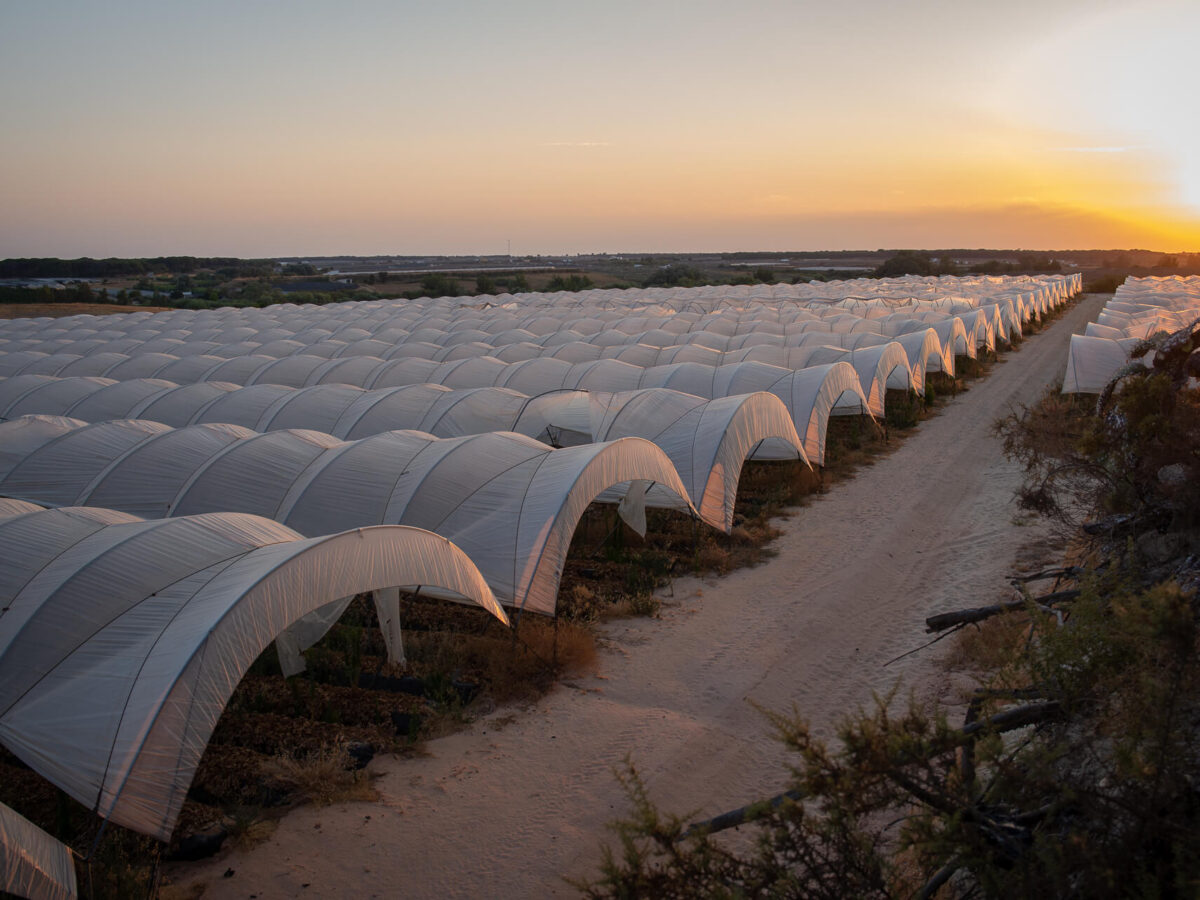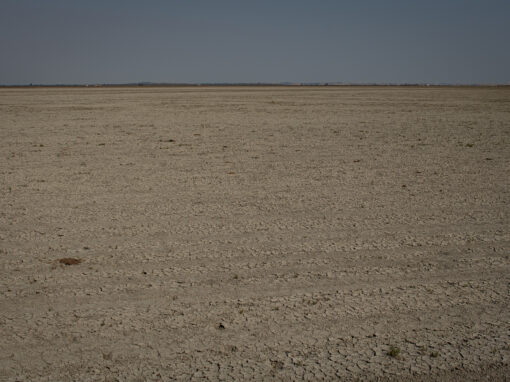Berries destined for Europe are destroying the Iberian peninsula’s source of wealth by overexploiting water and soil resources, turning its rural areas into plastic-covered deserts.
On a breathless summer morning in El Rocío, a village bordering Spain’s Doñana National Park, Juan Romero points to a map detailing the surrounding area. “Here are the berry crops,” he says, tracing their encroachment of the park from the north and west. “It’s all full of plastic.” For years, the retired teacher-turned-activist has documented the worsening impacts of intensive berry cultivation on Doñana with the group Ecologistas en Acción. “Agricultural interests have taken precedence, and what matters least…is the conservation of Doñana,” says Romero. “This is unsustainable, unviable.”
Across southern Spain and Portugal, row upon row of plastic greenhouses stretch to the horizon where rain-fed olives, grapes and wheat traditionally grew. Together, the Iberian countries are Europe’s main producers of water-intensive berries. Many defend Iberia’s berry industries as lifelines in impoverished areas with few other economic opportunities. Yet others question why one of the continent’s driest and most climate vulnerable regions, prone to water scarcity and desertification, is feeding Europe’s growing appetite for berries.
Enticed by market demand and lucrative profits, intensive berry cultivation in southern Iberia is fuelling the unsustainable exploitation of water and land resources. On both sides of the border, scientists, researchers, activists and locals warn urgent measures are needed to halt further environmental degradation. “An agricultural model that’s incompatible with biodiversity makes no sense,” says Romero.
Biodiversity refuge pushed to collapse
It wasn’t always this way. In the 1980s, farmers in the province of Huelva began abandoning dryland crops to grow berries, which offered greater returns. Spain quickly became a world-leading producer and exporter of strawberries, blackberries, blueberries and raspberries, with 2021 exports generating over €1.7 billion. Every year, up to 90 per cent of the berries produced in Spain – mostly grown across 11,000 hectares in Huelva – are exported to Germany, France, the Netherlands, the UK and other European countries.
Situated on the bank of the Guadalquivir River where it flows into the Atlantic Ocean, Doñana’s diverse ecosystems, such as marshes, ponds, dunes and forests, support a rich array of biodiversity. Owing to its strategic location, hundreds of thousands of birds use Doñana – one of Europe’s most important wetlands and a UNESCO World Heritage and Ramsar site – to breed, winter and rest on their migratory path to and from Africa.
Pushed to its limits, this biodiversity refuge is collapsing. For decades, the aquifer sustaining the park has been under pressure from withdrawals to irrigate expanding berry crops. For nearly as long, scientists sounded the alarm of the risks unsustainable groundwater extraction posed to Doñana. But their warnings fell on deaf ears.
In 2020, the aquifer was officially declared overexploited. Its depletion has been hastened by withdrawals from over 1,000 wells lacking legal authority and permission, and the historical permissiveness of the public administration. To date, only a quarter of the illegal wells have been closed.
As water disappeared, so has biodiversity. Over the past winter, the number of birds recorded in the park plummeted to 87,500 – less than one-fifth of last year’s 470,000. “Doñana is losing its potential to host birdlife because it’s losing its ecological conditions. Ecosystem structures are becoming non-functional,” says Carlos Dávila, coordinator of environmental organisation SEO/Birdlife’s Doñana technical office.
Although Mediterranean species can cope with dry spells, they have their limits, says Carmen Díaz Paniagua, a researcher at the Doñana Biological Station. “Flora and fauna are adapted to resist alternating dry periods, but when the period is very long, they cannot resist. And this is the situation we’re now in,” she explains. Combined with anthropogenic withdrawals, lack of rainfall has caused hundreds of ponds depending directly on the aquifer level to disappear. Without water, aquatic species such as birds, amphibians, insects, reptiles and plants, are struggling to survive and cannot complete their reproduction and germination cycles.
Where ponds once teemed with life, shrubs and trees are colonising dry ground, a shift in ecosystems Díaz Paniagua says is difficult to reverse. “Even if you remove the bushes and one day there’s water again, there won’t be any species because they’re gone.”
Berry cultivation also impacts surface water flowing into the park. Research shows the fivefold expansion of berry crops and agrochemical use in Doñana’s surroundings has contributed to the contamination of entry streams and edges of the marsh by nutrients used in fertilisers. In recent decades, eutrophication (a process when water becomes overly enriched with nutrients) in Doñana has accelerated, often reaching levels scientists say are incompatible with biodiversity conservation. “You can’t manage protected areas in one way and unprotected areas in another way, because everything is interrelated,” says Dávila. “The only possibility that Doñana has left…is to change the socioeconomic model that surrounds the protected area, to stop treating Doñana as an island.”
“Compromising our future for their profits”
Across the border, greenhouses stretch along the Atlantic coast, the plastic sheeting glowing in the sun. Instead of surrounding a protected area like Doñana, the greenhouses have been established right inside Portugal’s south-western Alentejo and Vicentine Coast Natural Park, a hotspot for biodiversity.
The region’s temperate climate, which allows longer growing seasons than in Spain, started attracting multinational agribusiness in 2004, when Driscoll’s, the world’s largest berry company (which has its headquarters in California), began producing strawberries inside the nature park. The region turned into a hub for intensive farming with the support of millions of euros in EU agricultural subsidies and tax benefits. Greenhouses and tunnels now cover over 1,700 hectares of the protected area and most of them produce berries for export. In 2020, berry exports to central and northern Europe generated nearly €250 million.
Portugal started intensive greenhouse farming more recently, but the environmental impact of this boom in production is already being felt. This thirsty industry is consuming scarce water resources, contaminating the area with agrochemicals and depleting the soil. More than half of the region’s unique Mediterranean temporary ponds, priority habitats protected under national and European legislation which host rare and endangered species, have been destroyed by intensive farming.
“The negative impact of the industry is well known, but Portugal is copying Spain’s model and allowing it to expand,” says Afonso do Ó, an expert on water and drought management. “Often, it’s the same big companies exploiting the region’s resources. Capital knows no borders,” he says.
Studies on climate change point to the Iberian Peninsula as a critically vulnerable territory with growing risk of water scarcity and desertification. But instead of adapting water demands in preparation for a reduction in rainfall and rising temperatures, the expansion of intensive agriculture is making the situation even worse. “We are not adapting. On the contrary, we are increasing the risks of running out of water,” says do Ó.
A succession of dry years has increased pressure on the region’s scarce water resources, and some have, indeed, run out of water. As agribusiness draws more and more water from the arid region, aquifers are being depleted faster than they can refill and wells are running dry. Last year, the private association managing the Santa Clara reservoir, which supplies south-western Alentejo, sent letters to more than 100 small farmers telling them they would have to find alternative irrigation sources.
“The association is managed by the owners of big agricultural companies, and their priority is profit, not sustainability or fair distribution,” says Diogo Coutinho, who lives near the reservoir and has seen it reach critically low levels in recent years. Agricultural companies consume about 90 per cent of the reservoir’s water, which is managed privately despite having been built with public funds.
Worried about the divergent trend of less rain but increased water consumption, Coutinho gathered with other residents to organise protests against agribusinesses and to demand a sustainable way of managing local resources. “This extractivist industry doesn’t benefit the region. It’s unsustainable, and it relies on the exploitation of migrant labour,” he says.
The greenhouses’ model of intensive agriculture depletes the water and soil as much as it depletes its workers. To meet Europe’s growing appetite for berries, agribusinesses in Portugal and Spain depend on migrant workers who pick berries by hand and live precariously. Many receive payment below the minimum wage, work long hours without breaks, and are exposed to agrochemicals without protection.
“They treat us like slaves, they just want to exploit us as much as they can, so they can profit more,” said Kishor Subba Limbu, a Nepali worker, on a sweltering summer day in the Portuguese region of Odemira, where he shares a small house with 20 other workers from Nepal and India.
“I had to work while chemicals were being sprayed,” said Rabin Singh, also from Nepal, who endured 10-hour shifts with just a half-hour break and was never paid more for working on holidays or weekends. He eventually left after four years in the job. “My eyes would burn and I couldn’t breathe while they were spraying fertilisers. But we still had to work, because if we didn’t, we would be sent home and wouldn’t be paid for the day.”
For Alberto Matos, who runs the Alentejo branch of Solim, an NGO supporting migrants’ rights, multinational companies are undermining Iberia’s source of wealth by extracting local resources and exploiting migrant labour, turning rural areas into plastic-covered deserts.
“These companies operate under the logic of maximising profits, with little concern for the long term effects of agrochemicals used, environmental degradation, or even people’s health,” he tells Equal Times. Shaking his head, he asserts: “They are extracting more and more water…and compromising our future for their profits.”
This story was developed with the support of Journalismfund.eu and was originally published in Equal Times.


